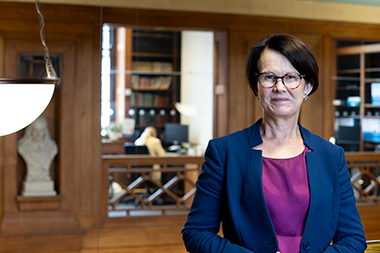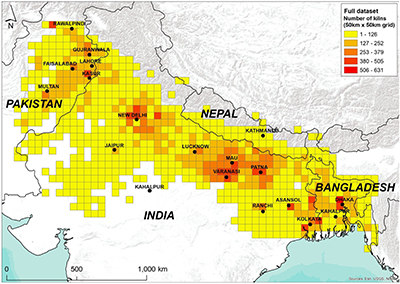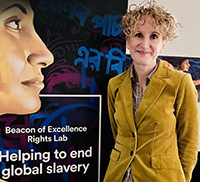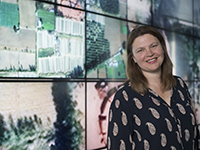The University of Nottingham has been awarded a prestigious Queen Elizabeth Prize for Higher and Further Education for its groundbreaking research tackling modern slavery.
The prizes, formerly known as the Queen's Anniversary Prize, are part of the UK national honours system recognising outstanding work by UK colleges and universities which demonstrates excellence and innovation and delivers real benefit to the wider world.
The award recognises the pioneering research by the university's Rights Lab to help tackle the global problem of modern slavery and forced labour, which has had a real-world impact and accelerated action for thousands of vulnerable people around the world.

We are immensely proud to win a Queen Elizabeth Prize for Education, the highest national honour for UK universities and colleges, for our research to tackle the major global challenge of modern slavery.
Professor Norman added: "This is research that has advanced the UK's national and global capability and reflects our university's goal of solving problems and improving lives. It also demonstrates our deep commitment to local collaboration: we are proud to partner across Nottingham on local work to become a slavery-free city."
First awarded in 1994, the prizes are granted every two years by the Sovereign on the advice of the Prime Minister following a rigorous and independent process of review carried out by the independent charity the Royal Anniversary Trust.

Prime Minister Sir Keir Starmer said: "This is a landmark year for the prizes marking 30 years of recognising and celebrating the tremendous contribution our universities and colleges make to the life of our country.
"The UK has always been a place of learning, invention and ambition. Our institutions of higher and further education are among the very best in the world. They educate the next generation, train our workforce, and lead the cutting-edge research that drives progress, not just here at home but across the world."
The 2025 prize completes a hattrick of royal recognition for the University of Nottingham - it was previously awarded a Queen's Anniversary Prize for its research and development of MRI technology in 2000 and for its Global Food Security research to help feed the world's growing population in 2011.
The Rights Lab's multidisciplinary team is the world's largest, leading group of modern slavery researchers. Founded less than 10 years ago, the Lab is now the global leader in modern slavery research.

I am very proud of our Rights Lab team, the University of Nottingham, and our incredible partners. We are profoundly honoured by the prize.
Professor Trodd added: "Ending slavery is within reach and the Rights Lab aims to shine a light into slavery's darkest corners. Working together with governments, businesses and NGOs, we have accelerated collaborative action that applies new knowledge at scale."
A flagship Rights Lab programme uses satellite data to map and measure modern slavery from space. The team maps industries with high levels of slavery, from farms and factories to mines and brick kilns. It identifies slavery's sites and risk markers, uncovers the links between forced labour and environmental destruction, and produces advanced explanatory models for slavery's nature and extent.
It brings together world-leading expertise from diverse disciplines: Professor Doreen Boyd's geography expertise combines with political science innovations to utilise geospatial data, including from satellites, for new estimates of slavery's scale; legal expertise to identify gaps in national legislation; business research to identify forced labour risk in global supply chains; and social policy research into community-based resilience, among other areas.
The research has supported large-scale civil society response through robust prevalence estimates with International Justice Mission, transformed business responses through a sector-leading forced labour risk tool with Moody's, and enabled survivor-led groups like Volunteers for Social Justice to liberate thousands of people using new mapping data, among other partnerships and impacts.

There are millions of people in forced labour worldwide, and a major obstacle to tackling this problem at scale has been an inability to see its location and extent. Country by country, we are finding the link between People and Pixels.
Professor Boyd added: "Through new satellite remote sensing, machine learning and citizen science geospatial approaches, we are analysing forms of exploitation that traditional methods can't access—bringing the power of Earth Observation data to action on the ground."
The winners were announced at St James's Palace on 25 November. The prizes will be presented at an investiture ceremony in February 2026.
Sir Damon Buffini, Chair of the Royal Anniversary Trust said: "The Queen Elizabeth Prizes for Higher and Further Education celebrate the power of education to change the world for the better. This much-loved national honour recognises, at the highest level of state, outstanding work in UK universities and colleges, and the remarkable benefit they bring to our economy, society and the wider world. This year we are delighted to honour 19 institutions whose work offers an inspiring snapshot of the excellent and innovative work going on in universities and colleges across the UK. Congratulations all!"






